29 Mar East Africa — Mooching along with a Pig Farmer – 1
What happens in this and the next three posts started with an innocent Christmas dinner in the Okavango Delta.
The Okavango is the biggest inland river delta in the world, and the loveliest. It’s in northern Botswana where the Kavango comes down from Angola and spreads out into the Kalahari Desert. With peninsulas of parched African bush threaded between tongues of marshland, the Delta provides a riotous home for every sort of bird
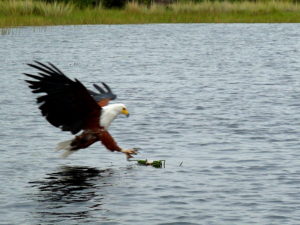
and animal
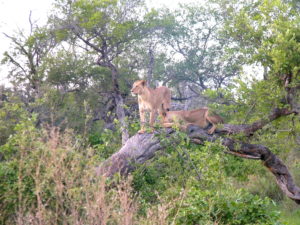
in southern Africa. Peg and I went there a lot.
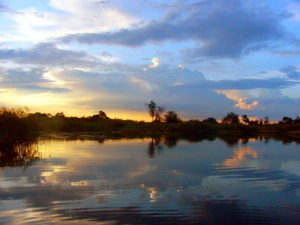
Christmas in the Okavango Delta
The dinner was at a fancier-than-usual lodge. Our table companions were a pig farmer from England, and his wife, who’d scored a last-minute, half-off deal on the same package we’d paid full price for. The pig farmer had, he told me, sold his interest in the farm for millions of pounds. His wife was American, an heiress I think, because she had millions, too.
Around the time the figgy pudding arrived and the fifth bottle of Christmas cheer was uncorked, the pig farmer announced that Peggy and I were welcome to stay with him and the Mrs whenever we happened to be passing through Buckinghamshire which, given the fact we were on the far bottom of the planet, wasn’t going to be any time soon, but what the heck? It was a nice gesture. Then, because there’s not much else you can say in that situation, I invited them to stay with us if they ever found themselves in Gaborone.
“Odd you should ask,” he smiled. “We’ll be there for New Year’s.”
New Year’s, I thought, we’ve got a WEEK to rearrange our schedules and get ready for this?
A week turned out to be optimistic. They arrived two days later. Or, at least, they arrived nearby. The Mrs wasn’t sure exactly where they’d arrived at. “How do we get to your house?” she demanded when I answered the phone.
“Where are you?” I said.
“I don’t know,” she said, and that was probably true. By then she’d ridden more than three-hundred-thousand kilometers around Africa and, as far as I could tell, hadn’t looked out the window once because she’d spent those three-hundred-thousand kilometers working crossword puzzles. “That’s why I need you to tell me how to get to where you are.”
“I have to know where you are first,” I said.
“I don’t know where we are,” she said. “That’s why I called.”
“If you don’t know where you are, how can I . . . ?”
“If I could tell you where we are,” she said, trying to mask the irritation in her voice, “We wouldn’t be having this conversation,” then began making noises like I was hiding our house from her.
“I know where our house is,” I said. “I just don’t know where you are.” It didn’t occur to me until later that, maybe, she’d had this conversation before. With people who really did pretend they didn’t know where their houses were.
“Then . . . just . . . tell . . . me . . . how . . .” she enunciated very clearly, like you do when you lose patience with a Customer Service Representative on the phone, “. . . to . . . get . . . to . . . your . . . house.” Hours, and many phone calls later, they showed up on the other side of our wall, and I let them in.
They lingered a week, then left to mooch off other people they had standing invitations with. A week after that, we got a gang-email detailing their adventures in Botswana with especial emphasis on the warm welcome they’d received from the nice lady and her husband who’d opened their hearts and their home to them. Over the months we received many more of these emails, each with a new name added to the growing list of recipients, every one of whom had shown them such wonderful generosity in their travels around Southern Africa. It really made your heart flutter to think of all the warm welcomes and warm homes, and surprised owners, who’d let them in.
Their trip around Southern Africa had, in fact, just been a warmup. A couple of years after we’d moved to Morocco, he invited me to accompany him on a more expansive tour. The idea was to drive from Nairobi to Alexandria, catch the ferry to Cyprus, hook up with the Mrs, catch a second ferry to Greece, drive across Europe, offload the Mrs, take another ferry to Tangier, motor down Africa to Senegal, load onto a fourth ferry, cross the Atlantic, land in Uruguay and launch into a tour of South America. In preparing for the trip he’d been a truly a heroic introducer of himself to strangers, and accumulated standing invitations on all three continents. I signed on for the Nairobi to Alexandria part.
He turned out to be a wonderful traveling companion. Always helpful. Always good-humored. Always bold and informed, he didn’t seem to have any sense of fear at all, and he did all the driving. If this had been the mid-Nineteenth Century, he would have been right there alongside Sam Baker and Richard Burton poking around for the sources of the Nile, except Sam Baker would have brought his wife, which he didn’t. That was another plus in my book. Also, he had a Defender 130, which has got to be the coolest ride anywhere.
Defender 130’s were limited-edition Land Rovers, custom built for the British army as guided missile carriers. They’d spent their military careers parked in the Black Forest pointing east and, when, the Soviet Union fell apart, the army put them on the market. By then, they had a lot of years on them, decades, actually, but almost no mileage, as if they’d come from an automobile museum. The pig farmer rebuilt his as a mobile home with a refrigerator, a sink, a stove, two beds, lots of storage, ten forward gears, a differential lock, a winch, and more traction than a Cromwell tank. He never mentioned what he did with the guided missiles, but he was a thrifty sort and I always supposed he stashed them in his garage.
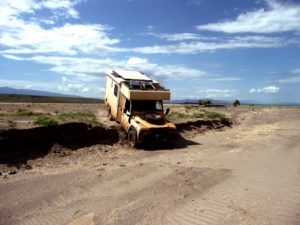
The Defender 130 doing its duty
Our first mooch, I thought when he met me at the Nairobi airport, and away we went.
The moochees turned out to be a former member of the British Council who was very worldly, and his wife who painted portraits of avifauna for a book she was doing on African birds. The book was going to be a very long time in the making because there are a lot of birds in Africa and because each portrait started out with an anatomically correct drawing of the bird’s skeleton. At least they looked anatomically correct to me. Once you get past drumsticks and wishbones I’m not all that well-versed on bird anatomy. When she got the bones right, she’d layer on sinews and muscles, fleshing out dark meat and white until she had a carcass plucked and ready for the stewpot. Then she’d insert feathers one at a time until, time out of mind later, she had a complete bird. I wished her well, but I wasn’t optimistic. Before she’s finished with that book geological time will have kicked in, birds will have evolved into something else, her paintings won’t be anatomically correct anymore and she’ll have to start over.
All of that painstaking need to concentrate may have had something to do with why she wouldn’t let us in the house. In the end, we spent the afternoon sitting in the 130 while she was inside assembling birds from scratch. When her husband came home, she gracefully betook herself to bed and left the two Englishmen and me knocking back shots of scotch. Somewhere toward the bottom of the bottle they concluded that it was all my fault America had been so tardy in entering the world wars. I took the position that not only had we sent our young men to die in Europe to save the British from their own folly in 1917, we’d had to do it all over again a generation later. In time, the host went off to join his wife and the pig farmer and I retired to our mobile campsite in the driveway.
He and I were up at first light but, when we knocked on the door, our host had departed for the day. That night the pig farmer cashed in a standing invitation with a puzzled-looking African lady who acted like she remembered him. But, then, Africans are automatically gracious where hospitality is concerned. The following morning we set out for Addis Ababa.
There’s an obvious way to get there from Nairobi, you drive north along the road to Addis. The pig farmer had a better plan. We’d head west to Lake Turkana and cross into Ethiopia through the backdoor. Since nobody in their right mind went that way, there weren’t any border posts, and we had to get stamped out of the country while we were still in Nairobi. They gave us eight days to make the trip, which was about right considering how slow it was getting out of Nairobi.
Early afternoon we became embroiled in the Traffic Jam of the Ages. Around sunset, motion came to a complete stall and, because we were approximately on the equator and it was raining and the guided missile carrier had gotten steamy, I had the window open. Which, in Nairobi, wasn’t such a hot idea. A hand reached into my pocket and grabbed my sunglasses.
I grabbed that hand.
That hand was mine. I had a good grip and I was going to hurt that hand.
And, then, it wasn’t mine. The hand was slippery from rain, the owner snatched it back, my sunglasses flew out the window and I leapt into the street yelling unfriendly words at the young man dancing out of reach.
“Sir, your glasses,” an elderly gentleman reached into the gutter, handed them to me, and I climbed back into the Land Rover, wishing that the pig farmer had thought to bring a few of his guided missiles along on the trip.
We had entered a part of the world that was unfamiliar to anybody whose experiences of Africa were centered on Botswana. The Land of Thieves. Within a few days a hitchhiker had stolen my shoes. If you’re reading this you shoe-stealing son of a bitch, I know what you look like.
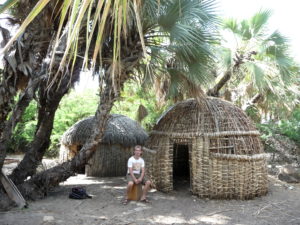
What the shoe-stealing son of a bitch looks like
Not long after, I had my camera stolen and, one afternoon, we discovered that the hook was gone from the winch on the front of the 130. We had even less idea how that came about. The hook had been bolted on.
“You got a number thirteen wrench on you?” I can hear one street punk saying to another.
“Metric or American?”
“Metric.”
“Yeah, Bro. Here you go.”


No Comments